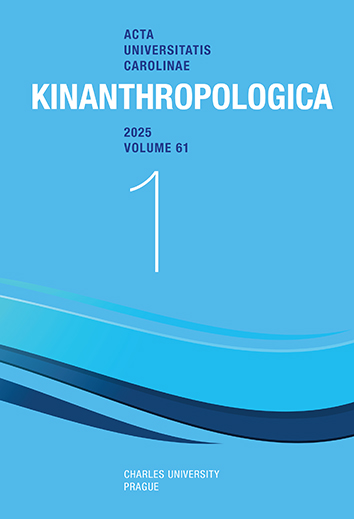Acta Universitatis Carolinae Kinanthropologica (AUC Kinanthropologica) is an international peer reviewed journal for the publication of research outcomes in the humanities, the social sciences and the natural sciences, as applied to kinathropology. It is a multidisciplinary journal accepting only original unpublished articles in English in the various sub-disciplines and related fields of kinanthropology, such as Anthropology, Anthropomotorics, Sports Pedagogy, Sociology of Sport, Philosophy of Sport, History of Sport, Physiology of Sport And Exercise, Physical Education, Applied Physical Education, Physiotherapy, Human Biomechanics, Psychology of Sport, Sports Training and Coaching, Sport Management, etc. The journal also welcomes interdisciplinary articles. The journal also includes reports of relevant activities and reviews of relevant publications.
The journal is abstracted and indexed by CNKI, DOAJ, EBSCO, ERIH PLUS, SPOLIT, SPORTDiscus, and Ulrichsweb.
AUC KINANTHROPOLOGICA, Vol 53 No 1 (2017), 35–48
Sports in the French Association of the Paralyzed: difficulties in creating and maintaining a consensual policy
Clément Gazza
DOI: https://doi.org/10.14712/23366052.2017.3
zveřejněno: 30. 06. 2017
Abstract
The aim of this research is to provide a better understanding of the effects of a trying to create sports policy within an organization that is not familiar with this subject. Participant observation, plus 46 interviews, revealed the difficulties in setting up a real policy within the French Association of the Paralyzed. Because of heterogeneous points of view, the development of these activities remains more like roughly assembled guidelines rather than a real sports policy. Nevertheless, we should be able to obtain a consensus in creating awareness, in training and bringing the support people to use physical activities in their caring practices.
klíčová slova: French Association of the Paralyzed; physical and sport activities; associative policy; partnerships; awareness; training
reference (22)
1. Badia, M., Orgaz, M. B., Verdugo, M. A., & Ullan, A. M. (2013). Patterns and determinants of leisure participation of youth and adults with developmental disabilities. Journal of Intellectual Disability Research, 57(4), 319–332. CrossRef PubMed
2. Brisenden, S. (1986). Independent Living and the Medical Model of Disability. Disability, Handicap and Society, 1(2), 173–179. CrossRef
3. Beaud, S., & Weber, F. (2010, 1st ed. 1997). Guide de l'enquete de terrain. Paris: La Découverte. PubMed
4. Bouttet, F. (2015). Organiser la pratique sportive des personnes handicapées. Entrepreneurs et dynamiques institutionnelles dans la construction de l'action fédérale. Doctoral dissertation. University of Strasbourg, France.
5. Compte, R. (2003). Le sport pour handicapés mentaux : ouvrir aujourd'hui pour demain le débat éthique. Empan, 51, 68–73. CrossRef
6. Compte, R., Bui-Xuân, G., & Mikulovic, J. (2012). Sport adapté, handicap et santé. Montpellier: FFSA & AFRAPS.
7. Creswell, J. W. (2012). Qualitative inquiry and research design: Choosing among five approaches. London: Sage publications.
8. Devaux-Spatarakis, A., & Gregot, A. (2012). Les défis de l'emploi de l'étude de cas en évaluation. Politiques sociales et familiales, 110(1), 33–44. CrossRef
9. Ehrenberg, A. (1991). Le culte de la performance. Paris: Calmann-Lévy.
10. Glaser, B., & Strauss, A. (1967). The Discovery of Grounded Theory: Strategies for Qualitative Research. Chicago: Aldine de Gruyter. PubMed Central
11. Goffman, E. (1963). Stigma: Notes on the management of spoiled identity. Englewood Cliffs: Prentice-Hall. PubMed Central
12. Kaufmann, J. C. (2007). L'enquete et ses méthodes. L'entretien compréhensif. Paris: Armand Colin. PubMed Central
13. Marcellini, A. (2005). Des vies en Fauteuil … Usages du sport dans les processus de déstigmatisation et d'intégration sociale. Paris: CTNERHI. PubMed Central
14. Marcellini, A., & Villoing, G. (2014). Corps, Sport, Handicaps. Le mouvement handisport au XXIeme siecle. Lectures sociologiques. Vol. 2. Paris: Téraedre. PubMed Central
15. Martel, L. (2010). Les politiques d'insertion par le sport du MJS entre 1981 et 2002. Analyse comparée de deux publics, les jeunes des quartiers et les personnes handicapées. Paris: Editions Connaissances et Savoirs. PubMed Central
16. Morin, A. (1985). Criteres de "scientificité" de la recherche-action. Revue des sciences de l'éducation, 11(1), 31–49. CrossRef PubMed Central
17. Olivier de Sardan, J. P. (1995). La politique du terrain. Sur la production des données en anthropologie. Les terrains d'enquete, 1, 71–109. CrossRef PubMed Central
18. Paillé, P., Mucchielli, A. (2008). L'analyse qualitative en sciences humaines et sociales. Paris: Armand Colin. PubMed PubMed Central
19. Pôle Ressources National Sport et Handicaps (2010). Etude sur la prise en compte du handicap au sein des fédérations sportives. Retrieved 14.09.2016 from: http://www.handicaps.sports.gouv.fr/images/stories/fichiers/prnsh/productions_prnsh/2010-Etude_PRNSH_Fedes.pdf. PubMed Central
20. Richard, R. (2013). L'expérience sportive du corps en situation de handicap. Approches praxéologique et socio-phénoménologique du foot-fauteuil. Doctoral dissertation. University of Paris Descartes, France. PubMed Central
21. Ruffie, S., & Ferez, S. (2013). Corps, Sport, Handicaps. L'institutionnalisation du mouvement handisport (1954–2008). Vol. 1. Paris: Téraedre. PubMed Central
22. Warshay, L. (1975). The Current State of Sociological Theory: a Critical Interpretation. New York: McKay. PubMed Central

Sports in the French Association of the Paralyzed: difficulties in creating and maintaining a consensual policy is licensed under a Creative Commons Attribution 4.0 International License.
157 x 230 mm
vychází: 2 x ročně
cena tištěného čísla: 190 Kč
ISSN: 1212-1428
E-ISSN: 2336-6052
